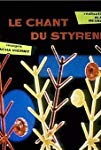Eye For Film >> Movies >> The Styrene's Song (1959) Film Review
The Styrene's Song
Reviewed by: Amber Wilkinson

Considering our 2018 viewpoint on the plastics industry - omnipresent and as something that, combined with our carelessness, has become a scourge of the environment - its hard to remember a time in the post-war period when it was busy revolutionising the domestic landscape. Alain Resnais' short documentary, although by no means a fully ringing endorsement, captures something of the thrill and excitement of the time.
Originally, commissioned by someone at plastics company Pechiney, who must have been fairly surprised by the avant garde result, the film starts with our objects of desire - most notably a red bowl - before taking us on a journey back through the processes that made it. With its Saul Bass-style credits, the documentary begins on a note as bright and upbeat as the plastics it shows. Colourful fronds grow like science-fiction plants and a variety of household objects are presented in still life in a way that recalls the likes of Mondrian, as we begin to see the industrial process that shapes the plastic.

These early scenes could almost be a modern art exhibit in their own right, with Resnais and his cinematographer Sacha Vierny - who also shot Hiroshima Mon Amour and Last Year In Marienbad among others - finding inventive and dramatic angles to capture the processes from. The faces we see are, with one exception, not human but the blank gaze of machine dials and this is just one of the hints at danger which crop up in the film.
Accompanying the vibrant imagery is narration in verse, scripted by French poet Raymond Queneau and read by Pierre Dux. It was written after the film was completed, allowing Queneau to match the rhythm of the images perfectly with his sometimes illuminating, often questioning consideration of plastic. The dramatic element is further enhanced by Pierre Barbaud's uplifting score (conducted by the equally talented George Delerue, who would go on to compose music for a huge number of films including Women In Love to Platoon).
As the film reaches its climax, we travel away from the shiny pipework, interesting facts and mould-makers as Resnais examines the more brutal exterior of the factory and the voice-over considers metamorphoses not fully understood. This philosophical note lends the film an additional air of mystery that, like the plastics, can be moulded in a variety of ways, depending on your viewpoint.
This short is included on the Studiocanal release of Last Year In Marienbad
Reviewed on: 16 Sep 2018















